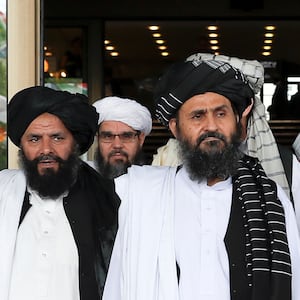The House Foreign Affairs Committee is calling on Zalmay Khalilzad, the lead U.S. negotiator with the Taliban, to brief Congress in September on the details of the deal he negotiated with the Taliban on U.S. troop withdrawal from the country.
“I am calling this hearing so that Congress and the American people will have the long-overdue opportunity to understand the contours of your negotiations with the Taliban and the potential risks and opportunities that may result,” chairman Rep. Elliot Engel (D-NY) wrote in a letter to Khalilzad, adding that the special representative’s agreement with the Taliban has “been disseminated among officials in the Trump Administration.”
Khalilzad said Monday the U.S. and the Taliban had agreed upon the deal “in principle,” but foreign officials and diplomats told The Daily Beast that the two parties are still working on ironing out final details. Meanwhile, inside the White House, senior Trump officials are still discussing how to continue to support Afghan security forces throughout the withdrawal process.
Khalilzad has for months engaged in negotiations with the Taliban in Doha, Qatar in an effort to find the best path for an American exit from Afghanistan after 18 years there. President Donald Trump has told advisers that he wants American troops out of the country by the 2020 election. And the Taliban has demanded that all foreign troops agree to leave Afghanistan as a condition to them signing the agreement. But officials in the Department of Defense and officials inside the Afghan government are pushing for the U.S. to keep some forces in the country for the foreseeable future. In the last few days of the negotiations, Khalilzad is under pressure to please all sides.
This would be the third time the committee has requested Khalilzad appear for questioning, but he has so far not shown. Engel and ranking member Rep. Michael McCaul (R-TX) extended an invitation in February; Democrats on the committee asked Khalilzad to appear in April.
“Given the challenges this Committee has faced in getting information from the Trump Administration on this issue, I want to be clear: I do not consider your testimony at this hearing optional,” Engel wrote. “If this letter is insufficient to secure your attendance, I will consider other options that would ensure this hearing takes place in a timely manner.”






